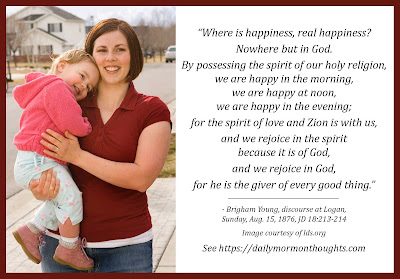"How vain it is in man to allow himself to think that he can make himself happy with the pleasures of this world. There is no lasting pleasure here, unless it is in God. When men leave the kingdom of God, their lives are filled with bitterness, their thoughts are full of fearfulness, and they are sorrowful, day by day. They may tell you they are happy. But when you probe them, and find out the inmost recesses of the heart, it is a cup of gall; they are not happy. They may seek, to the uttermost parts of the earth, for happiness, but they find it not.
"Where is happiness, real happiness? Nowhere but in God. By possessing the spirit of our holy religion, we are happy in the morning, we are happy at noon, we are happy in the evening; for the spirit of love and Zion is with us, and we rejoice in the spirit because, it is of God, and we rejoice in God, for he is the giver of every good thing. Every Latter-day Saint, who has experienced the love of God in his heart, after having received the remission of his sins, through baptism, and the laying on of hands, realizes that he is filled with joy, and happiness, and consolation. He may be in pain, in error, in poverty, or in prison, if necessity demands, still, he is joyful. This is our experience, and each and every Latter-day Saint can bear witness to it."
- Brigham Young, discourse at Logan, Sunday, Aug. 15, 1876, JD 18:213-214Even in the "pioneer days" of Brigham Young, there was quite a dichotomy between the "pleasures of this world" and the "lasting pleasure" that comes form the Gospel plan. President Young was convinced there was only superficial or pretended happiness in the world's approach. This summary of the source of happiness is concise and inspiring:
Click here to read the full talk
"We are commanded to be joyful because he has borne our sorrows. He was a man of sorrows and acquainted with grief so that we need not be. Our own sins and limitations are the things that make us sad. He had no sins and limitations; he was not sad for his sake, but wholly for ours. Only one could suffer for others who did not deserve to suffer for himself.
"If we remain gloomy after what he did for us, it is because we do not accept what he did for us. If we suffer, we deserve to suffer because there is no need for it if we only believe in him."
- Hugh Nibley, “Prophets and Glad Tidings”, The Prophetic Book of Mormon, CWHN 8:259
What a marvelous perspective. Truly, there is great joy in the gospel of Jesus Christ!
(Compilation and commentary by David Kenison, Orem, Utah, 2021)
June 1, 2015




















